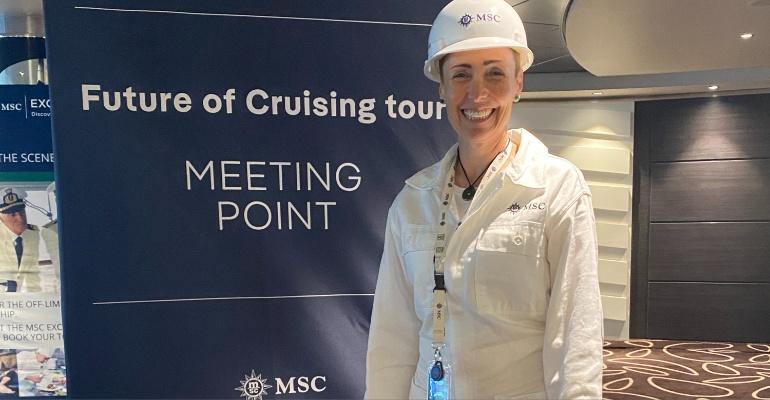But there are no immediate plans to repeat the feat, and Linden Coppell VP of sustainability and ESG at MSC Cruises, told Seatrade Cruise News why.
‘For us, this particular voyage is a call to action. It's basically saying, look, we can do it,’ she said.
So what are the obstacles to future sailings using the mass balance method? Commercial viability.
‘The growing amount of bio[fuel] means it's definitely there to be had. It's more about the cost to us, to be frank,' Coppell said. The solution, she added, will come from ‘scaling up,’ and hopes for future government incentives to drive the process.
What is the mass balance system?
MSC Cruises purchased 400t of bio-LNG fuel for the sailing – the amount calculated as equal to the ship’s predicted fuel burn — a blend of renewable feedstocks from 11 suppliers. But it would call for a natural gas processing plant ‘in the backyard,’ as Coppell put it, to ensure these few hundred tons made their way onto the ship comprised only of bio-LNG.
Instead, the cruise line relied on pre-existing systems to move the fuel out of Denmark where it is filtered into the grid — and that fuel is a combination of renewable feedstocks, as well as fossil feedstocks.
The fuel pumped into the vessel, therefore, is not from 100% renewable feedstock.
'It's frustrating because you've got to use the systems you've got,’ Coppell professed. At the same time, she emphasized MSC Cruises has the bunker note to prove its purchase of 100% bio-LNG, as well as certification from the ISCC attesting to its purchase of a credible, sustainable, traceable and deforestation-free biomass product. Significantly, the method is also compatible with the European Union's renewable energy directive set up to promote and regulate renewable energy.
‘We've got all the certificates, we've been given everything,’ added Coppell. ‘These bodies check that this method is doing what it says on the packet — that we are getting those emissions reductions. Even though we might not physically get the 400t of bio-fuel, it's accounted for and very strictly regulated systems make sure that nobody else is buying it.
‘And this is the mass balance: We're able to say, even though we will still emit, it's about soaking in that carbon from the atmosphere. If it's agricultural waste, the carbon is being soaked in whilst the agriculture is growing. When it degrades, instead of emissions coming from that, we're collecting that methane and putting it into the system. That is our reduction.’
If there is 30% biogas in the grid, MSC Cruises can expect to receive 30% of that. The amount depends on exactly how much biogas is being fed into the wider system, a network growing at an increasingly fast rate in Europe.
Will other cruise lines follow suit?
The more people invest in green energy in the grid, the more it helps to encourage higher quantities of green energy, reducing the costs set by suppliers.
MSC Cruises hopes governments will invest in infrastructure production facilities capable of supporting the maritime industry, in the same way large solar power facilities and wind farms materialised due to government intervention in electrical power. Coppell predicted it will take several decades otherwise until renewable feedstocks make up the majority of what is fed into the system, therefore generating vast emission reductions across the grid.
‘We'd have to have places such as Nigeria and Oman providing bio-LNG taken from somewhere else; Europe hasn't got enough agricultural waste to fill the demand,’ Coppell said.
The path forward
MSC Cruises' goal is clear: it wants more renewables to feed into the network.
‘We want acceptance for this mechanism; it's accepted by the EU and certification bodies,' Coppell said.
‘We're not saying we're doing it like this because it is the only choice we've got; we're doing this because it is the best system that works.
‘We don't want this to ever change, all we want is for more renewables to go into the system and that will drive the cost down. Any other way other than adding into the existing system will compromise the benefits to the environment.’
She concluded with the analogy: ‘Is it better to have one small wind farm in the back of everybody's garden? Or is it better to have a huge facility out there that generates 20 times more and much more effectively?’
Copyright © 2024. All rights reserved. Seatrade, a trading name of Informa Markets (UK) Limited.
Add Seatrade Cruise News to your Google News feed.  |

